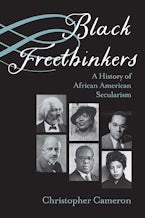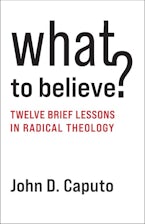
Black Freethinkers
A History of African American Secularism
248 Pages
- Paperback
- ISBN: 9780810140783
- Published By: Critical Insurgencies
- Published: September 2019
$34.95
In the afterword of Black Freethinkers: A History of African American Secularism, Christopher Cameron claims: “Black freethinkers have held a wide array of religious opinions. . . .What has united them is a commitment to reason, to improving life in this world, and to challenging racial inequality . . . black freethinkers have been no fringe sect but rather people operating at the center of black life since the nineteenth century” (173–174). Rebuffing the assumed “innate religiosity of black people” (xi), Cameron’s text argues that there is a long tradition of secular thinking in African American intellectual and religious life, from slavery well into the 20th century. Cameron’s historical overview addresses four periods central to African American freethought: enslavement, the New Negro movement, the War years and the rise of socialism and communism, and Civil Rights and Black Power.
African American freethought takes shape post-Enlightenment, notably with the publication of Thomas Paine’s The Age of Reason, the rise of deistic and liberal religious world views, and a general skepticism toward the established church. Within this intellectual paradigm, enslaved and free Blacks pontificated upon the moral, ethical, and religious disconnects between the professions of Christian faith and the enthusiastic perpetuation of the slave system. Many of the enslaved rejected religion completely, due to an irreconcilability of enslavement with gospel message of unity in Christ. Both enslaved and free Blacks were in many ways ushered into freethought due to the support for, and impotence toward the abolition of, slavery among both white northern and southern churches. Initially, freethought and nonbelief among African Americans was a direct consequence of the lack of faith many had in Christianity to address the social ills of slavery and the material conditions of African American flourishing. Of the latter, this would be a recurring theme for future Black freethinkers, including the literary community.
African American writers created a support network for Black freethought expression, particularly among Black populations in the urban north. Secular thinking and critiques of theism found ample space in the writings of Langston Hughes, Alain Locke, Zora Neale Hurston, Claude McKay, and Richard Wright, among others. Cameron is careful to nuance the views of these writers, as each expresses myriad conceptions about the nature of religion, despite spaces of overlap in their respective positions. Many Renaissance writers and artists dismissed or deemphasized religious faith on philosophical grounds due to their perceptions of God’s impotence. Some, like Locke, thought religious belief retarded human progress and unity (63), while others, like Hurston, held that any transhistorical deity was not a providential force for humanity. Other works, such as Nella Larsen’s Quicksand (Martino Fine Books, reprint 2011), depict the restrictive, spirit-killing, and creativity-denying impacts of the Black church on the lives of women, thereby spotlighting the theme of sexual oppression as a feature of restrictive theologies (75).
Socialist and communist critiques were also attractive to freethinkers. Black freethinkers tied to the Communist Party were largely concerned with improving material existence. They believed Christianity to be myopic in its advance of Euro and American empire vis-à-vis capitalistic political economy, thereby sedating the rebellious consciousness of the marginalized. Marxist Black freethinkers, such as A. Philip Randolph, were guided by both material and historical views of human progress and culture, leaving little tolerance for thought and praxis rooted in the “will of God” (118).
Cameron completes the book examining Black freethought during the Long Civil Rights movement. From the start of World War II and with the emergence of Martin Luther King, Jr., Cameron cites evidence of a renewed militancy among grassroots activists, notably with the establishment of the Student Nonviolent Coordinating Committee (SNCC) and its philosophical embrace of secular humanism. The adamant atheism of James Forman, a SNCC leader, represents the more radical secularist wing of SNCC. In Forman’s view, belief in God pacified Blacks and prompted a quietism that rendered them lethargic toward their own pursuits of liberation. Radical secularism and atheism was further inculcated in the Black Power wings of the movement. Many Black Panthers justified their atheism, similar to Forman, based on their critique of the escapism taught in Christianity, which emphasized flourishing in an “afterlife” rather than addressing the suffering and degradation of material existence. On this score, the ties between religion and racism were not lost upon the Panthers and other civil rights activists who advocated freethought positions.
Alongside the manifesto from the National Council of Negro Churchmen in 1966, and the publication of James Cone’s Black Theology and Black Power (Orbis Books, 1969) and A Black Theology of Liberation (Orbis Books, 1970) thereafter, uncovering the underbelly of American racism as a function of (white) Christianity became a cultural project for African Americans. Black theology, which posited that God was on the side of the oppressed and marginalized, sought to foreground the experience of the Black poor in light of scripture, and as such, held a humanistic position that created some bridges with Black freethinkers (146). Within a strictly academic purview, secular religious studies scholars offered intellectual critiques—namely, on the problem of evil and pertaining to the consistency of theological claims about God’s intervention in Black suffering. Cameron also spotlights the Black arts movement, namely literary production, and notes how secularism and freethought found its way into Black writing. Here, the contributions of Lorraine Hansberry, Alice Walker, and James Baldwin are prominent, writes Cameron, as each critiques the efficacy of religion and its capacity to foster fulfillment in Black life. In their writings, Black religious culture is multifaceted: it is presented as a source of communal cohesion, nurturing, and fulfillment, but also the source of great trauma, particularly for women, gays, and lesbians.
In the present, Cameron links the greater visibility of Black freethought in part to the growth of national and local secular organizations, such as African Americans for Humanism, Black Atheists of America, Black Nonbelievers, and Black Skeptics of Los Angeles. These groups provide resources, literature, and perhaps more importantly, a sense of community in a society that is both racially and religiously biased.
Cameron’s study packs a lot of information into a relatively slim African American religious history. Where he succeeds in particular is painting a picture of the endurance and staying power of an insurgent philosophical posture in African American thought and history that is often muted or ignored outright. While the Black church is a fixture in the story of African American experience, and while numerous ethnographic studies highlight the higher rates of religious participation among African Americans, particularly Christians, Cameron’s work troubles the easy categorizations of the African American religious landscape. This is therefore a useful resource in unpacking and expanding upon conceptualizations of African American religious thought and life.
Darrius D. Hills is an associate professor in the Department of Philosophy and Religious Studies at Morgan State University.
Darrius HillsDate Of Review:July 19, 2021
Christopher Cameron is an associate professor of history at the University of North Carolina at Charlotte. He is the founder of the African American Intellectual History Society, the author of To Plead Our Own Cause: African Americans in Massachusetts and the Making of the Antislavery Movement, and a coeditor of New Perspectives on the Black Intellectual Tradition (Northwestern, 2018).











